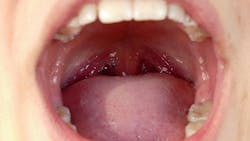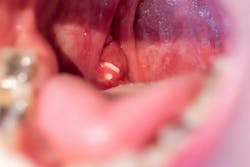Tonsil stones: Symptoms, prevention, and treatment in the dental setting
What are tonsil stones?
The tonsils offer many nooks and crannies that bacteria can use to thrive. The multiplying bacteria can become trapped, allowing mucous and dead cells to linger and form tonsil stones in the pockets of the tonsils.1 Tonsil stones, also known as tonsilloliths, are formed when the trapped debris calcifies. The stones can lead to chronic inflammation and discomfort.
The most common symptom (and often the only symptom patients experience) is halitosis. If the tonsil stones are left untreated, bacteria continue to multiply and increase the inflammation of the tonsillar tissue. Symptoms of a severe throat and discomfort when swallowing are frequently experienced with tonsil stones that have gone undiagnosed and untreated. Additionally, patients can experience ear pain due to the swelling of the tonsils.1
Why they manifest
When studying the bacteria causing inflammation of the tonsils, researchers have found both aerobic and anaerobic bacteria. One study reported that “[s]ome of the anaerobic bacteria produce volatile sulfur compounds such as hydrogen sulfide and methyl mercaptan. The volatile sulfur has been implicated in halitosis.”2 Therefore, patients who are prone to tonsil stones should avoid pastes, rinses, and drinks, such as wines, that contain sulfur.
Patients that have postnasal drip, allergies, or colds are more prone to the formation of tonsil stones due to the mucus in the back of the throat. Implementing a natural xylitol-containing nasal spray, such as Xlear, two to three times daily can help eliminate the mucus and prevent the progression and formation of tonsil stones.
The active ingredient of xylitol works to reduce the amount of bacteria by increasing the salivary flow to create a moist environment that is oxygen-rich.3 The oxygen-rich environment inhibits the bacteria. This can lead to prevention and eliminate the progression of tonsil stones.3
Reducing the amount of bacteria in the oral cavity will help prevent tonsil stones. Dental hygienists can advise patients to have meticulous home care with electric toothbrushes, flossing, and rinsing with sulfate-free products. Avoiding consuming beverages with carbonatation, sulfur, or dairy products will reduce the risk and growth of tonsil stones.4
Removing tonsil stones chairside can be completed with an air/water syringe or a tongue depressor. Gently use the air/water syringe to spray the stones out of the tonsillar folds while using the suction to remove debris. The back of a tongue depressor can also be used to gently push the tissue down around the stone to then elevate the stone up and out.
Properly screening the patient for abnormalities through a head and neck exam will allow the clinician to identify the presence of tonsillar inflammation and stones. If left untreated, tonsil stones can lead to severe throat and ear pain. Chronic tonsil stones can lead to the removal of the tonsils, which are a vital part of the immune system.
Editor's note: This article was originally published April 17, 2017 and was updated November 2024.
References
1. WebMD. Tonsil Stones. Available at: http://www.webmd.com/oral-health/guide/tonsil-stones-tonsilloliths-treatment. Accessed March 2, 2017.
2. Ansai T, Takehara T. “Tonsillolith as a halitosis-inducing factor,” British Dental Journal, vol. 198, no. 5, pp. 263–264, 2005. Accessed March 2, 2017.
3. Xlear. Xlear Sinus Care. Available at: http://www.xlear.com/xlear-sinus-care/. Accessed March 2, 2017.
4. Kim C. How to Prevent Tonsil Stones.Tonsil Stone Advisor. Available at: http://tonsilstonesadvisor.com/how-to-prevent-tonsil-stones/. Accessed March 2, 2017.
About the Author

Amber Auger, MPH, RDH
Amber Auger, MPH, RDH, is an international lecturer, 2019 Sunstar/RDH Award of Distinction recipient, and creator of Thrive in the OP and the certified Functional RDH. With more than 24 years in the dental field and practicing hygiene since 2010, Amber empowers professionals through on-demand courses and coaching. She specializes in root-cause soft tissue management, practical protocols, and career development, inspiring clinicians to enhance patient care and achieve career satisfaction. Reach Amber at [email protected].

